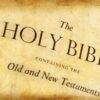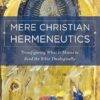Category: Evangelical Calvinist
Writings from the blog: Athanasian Reformed (aka The Evangelical Calvinist). Senior Reformed scholars present a coherent and impassioned articulation of Calvinism for today’s world.
Problematizing a Development of Sacra Doctrina within the Church: With Reference to Peter of John Olivi
Bernard McGinn writes the following with reference to the apocalyptic-theology-of-history present in the mediaeval theologian, Peter of John Olivi’s (c. 1248—1298) thought: The invective Olivi directs against the evidences of the carnal Church is concerned not only with the ecclesiastical abuses of the day, especially with avarice and simony, but also, like Bonaventure before him, with the use of Aristotle in theology. The Provençal Franciscan also expressed belief in a double Antichrist—the Mystical Antichrist, a coming false pope who would attack the Franciscan Rule, and the Great, or Open Antichrist, whose defeat would usher in the final period of history….
Reading the Bible as a Christian: The Outer and Inner Reality of Scripture
Scripture has an outer logic and an inner logic. Back in the day this was referred to as its outer and inner clarity (perspicuity of Scripture). In some ways the rift between the disciplines of biblical studies and systematic theology pivots on which one of these the practitioner is focused on. That is to say, the biblical studies folks, typically focus on the outer components of the text; i.e., its grammar, philology, sitz im leben (e.g., historical situadedness), composition, transmission, and other “text critical” factors. Whilst the systematic theology folks focus more on the inner-theo-logic of the text; attempting to…
The Elect of God: Jesus, the Torah-Keeper
Interesting, as Jesus becomes human for us, and fully obeys and keeps the Torah (Law) for us, at the same time, because He is for us, He dies as if He hadn’t kept the Law for us, cursed, hung on a tree. And yet because He remained perfectly complete to the Law for us, all the way to suffering the consequences of no-Law-keeping, He is understood as simultaneously both the reprobate and elect of God for us in His consubstantial nature as fully God and fully Man for the world. There is a double election—an election for our reprobation and…
Theology as Discipleship
Be diligent to present yourself approved to God as a workman who does not need to be ashamed, accurately handling the word of truth. –II Timothy 2.15 For a long time, I’ve thought of reading and doing theology as an act of sanctification and discipleship. How else is the Christian supposed to act rightly (orthopraxis) without knowing rightly (orthodoxy)? These are bound together in a dialectical bundle whilst the one implicates the other, and vice versa. In short: without the work of prayerful and worshipful study before God there cannot be any Christian growth. When the disciple does a word…
My Final Oxford Essay for My Philo Rel Course: God’s Existence in Cosmic Relief
God’s Existence in Cosmic Relief Is there any need to explain why there is a universe at all? Would God be an explanation? This is the question the rest of this essay will engage with. 1) This essay will reason on the moral need for an explanation of universe’s existence vis-à-vis human teleology. 2) Based on the affirmative of point one this essay will further attempt to reason from the universe’s apparent contingency concerning God’s existence as the best inference to an explanation, regarding the universe’s existence in general, and human existence embedded in the universe in particular. 3) For…
The OT and NT God are One in the Same
It is artificial and anachronistic for people to look back at the economy of God in the Old Testament, and presume that God Himself is subject to our modern ethical sensibilities (whatever those might be). The Old Testament took place in the Ancient Near East (ANE). And God’s dealings with humanity at that time were in those conditions (sitz im leben). Often modern and postmodern people look back at the OT, and its “violence passages,” especially the ones where God commands His covenant people to wipe out whole people groups and nations, and wince. They try to explain it away…
Oxford Trained Philosopher of Religion
I am an a officially trained philosopher of religion at the University of Oxford . Athanasian Reformed
KJV’s Mere Christian Hermeneutics
Just finished. As an after Barth, Torrance, Calvin, Athanasius (and patristic theology), John Webster (on Scripture) person, I would say that Kevin J. Vanhoozer’s book fits well with what us Evangelical Calvinists (after our books and my blog work) call a Dialogical Theology and reading of the text of Scripture. It is more about the encounter, transformation, and instrumentality of the reading of Holy Scripture versus the academic slicing and dicing of things; the latter often being under higher critical antisupranaturalistic pressures. This is not to say that the grammatical historical has no place, but that such a frame is…
Bosom of the Father Knowledge
No one has seen God at any time; the only begotten God who is in the bosom of the Father, He has explained Him. –John 1:18 Jesus has brought all who will, because He first willed for us, into the bosom of the Father in union with Him. It is here, this locale, where knowledge of God alone obtains. It is God’s Self-knowledge that He has invited us into, as if a banqueting table. The Christian, by the grace of God in Christ, shares in the divine nature; indeed, the particular nature of the particular and only living God. Without God’s revelation there would…
Disallowing Secular Unbelief to Dictate the Terms of God
Secular, worldly unbelief. I think Christians often allow the bar to be set much too low. Much of Christian theology, for example, especially those that have taken shape in the natural theology forest, allow the skeptic’s unbelief to dictate the types of questions the theologians seek to answer. Primary of which are observed in Thomas Aquinas’ Prima Pars (first part) of his Summa Theologiae. Here, Thomas seeks to answer the questions of God’s existence, and whether or not it is coherent to believe that God exists (like a generic God; albeit, in Thomas’ context this would be applied to the…






